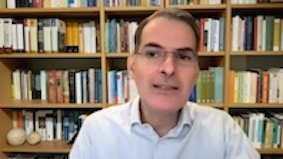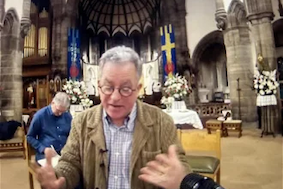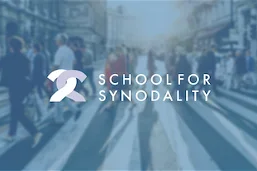Understanding the Theology of Synodality with Rafael Luciani

Rafael Luciani
The Scottish Laity Network were delighted to welcome their speaker and companion for their first event of 2022 when Venezuelan theologist, Rafael Luciani spoke on Thursday 18th January on the subject, 'Understanding the Theology of Synodality'.
Following the SLN's Journey of Discernment, in early 2020, when we were called to reflect on 'the signs of the times' and discern the promptings of the Spirit, we recalled the words of Pope Francis when he said that, "the Synod is an ecclesial event and its protagonist is the Holy Spirit. If the Spirit is not present, there will be no Synod."
Since the Church was convoked to a Synod with the motto: For a Synodal Church: communion, participation and mission, some may have felt uncertain as to what role they were being asked to play. Rafael made clear in his thought-provoking and energising talk that, for all in the Church, whether lay, religious or clergy, this was a Kairos moment.
Describing the Synod as the most important time in the current phase of the reception of the second Vatican council under the pontificate of Pope Francis, he said it was a great and challenging call for the Church to embrace change and reform into a new ecclesial model for the third millennium. He said it called for a deepening of ecclesiology of the people of God and that Pope Francis had said that the path of synodality is the path that God expects from the Church in the third millennium.
Rafael explained that it was also being done in a context of urgency to renew ecclesial life. He said this could be done by adhering to two simple but challenging attitudes: by taking advice and by building consensus.
As an example, he quoted the principle of medieval canon law which stated that "what affects all, must be treated and approved by all". What a challenge! He referred to previous examples in the Church's history where the exercise of power had been recognised as needing to be executed with shared responsibility.
His first point to explore and understand the theology of synodality was to be a Church of Listening. Everyone has something to say and something to learn. It's a reciprocal process. He encouraged us to download from the Vatican website what he thought of as Pope Francis' most important ecclesial speech, during the 50th anniversary of the Institution of the Synod of Bishops, where he expounds on this topic.
He said the exercise of listening was indispensable in a synodal ecclesiology because it recognises every person in the Church, from lay through to the Pope, based on what he called "horizontal relationships founded in the radicality of baptismal dignity" which recognises the common priesthood of all the faithful.
Our shared participation leads to a contribution from each one of us, to "something that completes the identity and mission of the other". We are not so much helping ourselves, as completing each other's vocation. It moves us to offer our own gifts in service to each other based on "mutual need", overcoming any sense of unequal relationships within the structure of the Church, such as superiority or subordination. It is the Holy Spirit which empowers us to offer the gifts with which we are blessed.
So to be listened to is the right of all of us, but to take advice, based on listening, is a duty incumbent on those who exercise authority.
His second point was that Synodality is a more complete way of being Church. He quoted Pope Paul VI during the second session of Vatican 11, who said that, "the Church needed to find this new complete way of being Church."
Rafael said that the rich diversity of the Church's members could lead to a communal way of proceeding. A listening process which involves praying, listening, analysing, dialoguing and advising is not simply a way to get to know each other better. It is a way to work together so that pastoral decisions can be made. It is one of the aspects that define the meaning and goal of a synodal process.
Without effectively translating this process into concrete changes, we run the risk of limiting the understanding and exercise of synodality to a mere effective practice without helping overcome the current clerical institutional model. For this reason, he highlighted that a Theological Commission has been set up to collaborate with the process in order to create channels and effective resolutions that may one day bring synodality into the ecclesial life at all levels.
This process begins at a local level so that the Church and its hierarchy, the teachers, don't just speak to, but listen to the Spirit in the people of God. Rafael quoted Lumen Gentium to explain the involvement of all the faithful and the need, at diocesan level, to make use of parish structures eg. parish pastoral councils, that exist already and also to create new structures so that we can involve those who live and work within our structure but also incorporate those who do not.
He said that this is perhaps one of the biggest challenges facing the current ecclesial institution. Without learning and taking advice from institutions and people from the rest of society, who are not part of the Church, we can't build an ecclesial consensus. We have to find a new ecclesial way of proceeding. A new structure based on consensus with results that are binding. We need renewal and reform of the institutional model and to embrace a whole new culture, a better model.
Rafael spoke about the life of the Church in his part of the world, Latin America, where the Church has learned to be a "community of communities", providing outreach to the wider community whether Catholic or non-Catholic. He spoke of Bishop/St Cyprian who created collaborative councils, long ago, of all branches of clergy and also a substantial number of laity and whose decision making was made by "consent of the plurality". This ideal of co-responsibility between the faithful and their Bishop is the template of what the Synod is aiming towards.
The link to Rafael's session is: https://youtu.be/uWAmk32qNoc


















